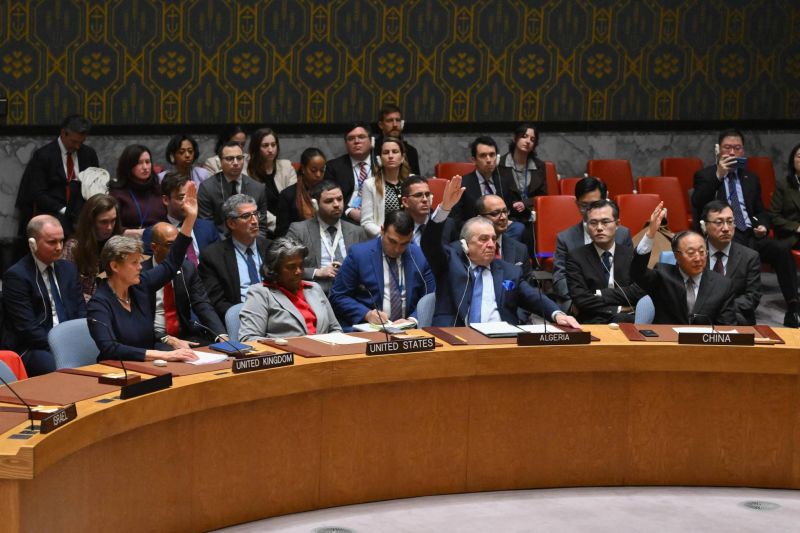
US Ambassador to the United Nations Linda Thomas-Greenfield (2nd R) abstains during a resolution vote calling for an immediate cease-fire in Gaza, as United Kingdom's Ambassador to the UN Barbara Woodward, Algeria's Ambassador to the UN Amar Bendjama and Chinese Ambassador to the UN Zhang Jun vote yes during a United Nations Security Council meeting on the situation in the Middle East, including the Palestinian question, at the UN headquarters in New York on March 25, 2024. (Credit: Angela Weiss/AFP)
After more than five months of war, the UN Security Council for the first time Monday demanded an immediate cease-fire after the United States, Israel's ally which vetoed previous drafts, abstained.
Drawing unusual applause in the often staid Security Council, all 14 other members voted in favor of the resolution which "demands an immediate cease-fire" for the ongoing Islamic holy month of Ramadan.
The resolution calls for the truce to lead to a "lasting, sustainable cease-fire" and demands that Hamas and other militants free hostages seized on Oct. 7.
Russia at the last minute objected to the removal of the word "permanent" cease-fire and called a vote, which failed to gain passage.
The successful resolution was drafted in part by Algeria, the Arab bloc's current member on the Security Council, with a diverse array of countries including Slovenia and Switzerland.
"For five months, the Palestinian people have been suffering terribly. This bloodshed has continued for too long. It is our obligation to put an end to it. At last, the Security Council is taking responsibility," said Algerian ambassador Amar Bendjama, although Security Council resolutions, while binding, are often ignored by the states involved.
The United States has vetoed previous bids for a cease-fire but has shown growing frustration with Israel, including its stated plans to expand its military operation to the packed southern city of Rafah.
A change in tone toward its Middle Eastern ally was seen Friday, when the United States put forward a resolution to recognize "the imperative" of an "immediate and sustained cease-fire."
But that text was blocked by Russia and China, which along with Arab states criticized it for stopping short of explicitly demanding Israel halt its campaign in Gaza.
The United States had repeatedly blocked cease-fire resolutions as it attempts to walk a line between supporting Israel with military aid and voicing frustration with leader Benjamin Netanyahu as the civilian death toll in the Gaza Strip mounts.
Unlike Friday's text, the call for a cease-fire in the new resolution is not directly linked to ongoing talks, led by Qatar with support from the United States and Egypt, to halt fighting in return for Hamas releasing hostages.
Israel has criticized the Security Council for previous resolutions that have not specifically condemned Hamas.
The new resolution condemns "all terrorist acts," but does not mention the Hamas attacks on Oct. 7, which resulted in the deaths of at least 1,160 people, mostly civilians, according to an AFP count based on official Israeli data. The militants also seized 250 hostages, of whom Israel believes around 130 remain in Gaza, including 33 presumed dead. No resolution adopted by the Security Council or the UN General Assembly since Oct. 7 has specifically condemned Hamas, a systematic absence consistently criticized by Israel.
Israel's military campaign in response to eliminate Hamas has killed more than 32,000 people, mostly women and children, according to the health ministry in the territory.
The Security Council has been divided over the Israel-Hamas war since the Oct. 7 attacks, only approving two of eight resolutions, which both mainly dealt with humanitarian aid.
And those resolutions seem to have had little effect on the ground, where UN personnel say Israel continues to block aid convoys as experts warn of looming famine.
Drawing unusual applause in the often staid Security Council, all 14 other members voted in favor of the resolution which "demands an immediate cease-fire"...